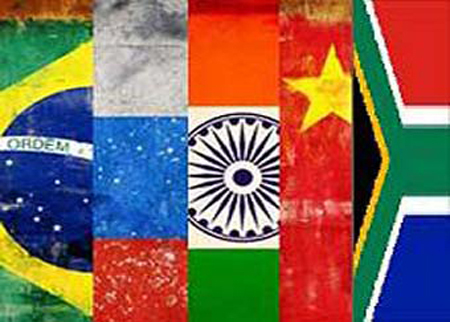These days are fully equipped with high level meetings on the two sides of the world. If we look at both the right and left side of the globe (depending from where you are looking) both Latin America and Europe are busy with meetings and conferences on social inclusion and sustainable development.
On one side we see BRICS countries ( namely Brazil, Russia, India, China, South Africa) convening in Fortaleza and Brasilia during the sixth BRICS summit to discuss about economic growth in the five countries, the new emerging powers in the global economy.
On the other one, we see a "European new government" struggling to find consensus on the need of a banking union.
Here in the heart of the World Cup games, where it seemed that only celebrations were taking place, the floor is given to politics and finance. Hot in the agenda will be the creation of two financial institutions that could reshape the global economic landscape. Two projects waiting for approval are on the table. First, the proposed New Development Bank. Second, the Contingency Reserve Arrangement. Let's see how they could function. The first one is intended to work as the World Bank- financing infrastructure and sustainable development projects through a $100 billion fund. Considering that the economic growth in the five countries is projected to average 5.37 % this year, and that the group of countries comprise 46 % of the world's population and account for more than 18 % of the global gross domestic product ( $16 trillion, with an estimated $4 trillion in combined foreign reserves), BRICS are paving to way for a new fresh approach to a global financing system.
The second proposal is the creation of the Contingency Reserve Arrangement (CRA) that could be of help to protect member states from financial shocks and to reduce their dependence on western institutions such as the International Monetary Fund.
The new BRICS bank, probably headquartered in Shanghai, will open in 2016 with an initial capital of $50bn, contributed in equal parts by each country.
Here finance ministers and central bank governors will be present, along with trade ministers, development bank authorities and two bodies representing the private sector. No NGO's, no rural movements and civil society.
Moving to Europe, where the European elections appointed the new president of the European Commission, along with new MEPs and the president of the European Parliament, Brussels is discussing on the Europe2020 strategy that takes into account a "new, sustainable, smart and inclusive growth" tackling education, more investment in R&D from the combined European GDP, decrease of the use of greenhouse gas emissions and poverty reduction. We shifted to social and environmental issues, forgetting that banks still play a central role in the European economic recovery.
The European central bank (ESB), which helps to keep prices stable in the Euro area, recently established a new system called Single Supervisory Mechanism (SSM), including the ESB and the national competent authorities of participating EU countries (also not belonging to the European Union) The goal of the SSM is to ensure the safety and soundness of the European banking system and to increase financial integration and stability in Europe. In this way the banking sector can be healthy and people' savings are safe. Another mechanism for a greater European banking union is the Single Resolution mechanism (SRM) which will apply to banks covered by the SSM. In the cases when banks fail despite stronger supervision, the mechanism will allow bank resolution to be managed effectively through a Single Resolution board and a Single Resolution Fund, financed by the banking sector.
In order for both financial institutions and banks to get to know the procedures to act and thus to regulate the prevention and management of bank failures, a set of legislative texts is included in the Single Rulebook, the actual new bible for financial institutions.
Let's not forget that the creation of a banking union was the EU's main answer to the financial crisis. 5 years ago, banks across Europe were stabilized using billions of taxpayers' money to prevent the financial meltdown from turning into a great depression. If we could apply a Tobin Tax for Europe we would be able to use this money to establish a "growth fund" useful in times of crisis.
To strengthen trust, stability and unity, we must act together. BRICS countries understood it and are acting upon it, why don't we Europeans make up our minds and bind together for a faster global recovery?
@GaiaParadiso
If you want to know more about BRICS and Europe, let me share some sources and press articles here below:
BRICS
•VI BRICS Summit
•Bloomberg
•The BRICS post
•The Guardian
•BRICS Joint Statistical Publication 2013
Europe
•EuroStat
•Taking Europe's pulse
•Europe2020 strategy
•How the president of the European Commission gets elected
•Banking union: Single Rulebook, Single Supervision, Single Resolution mechanisms

